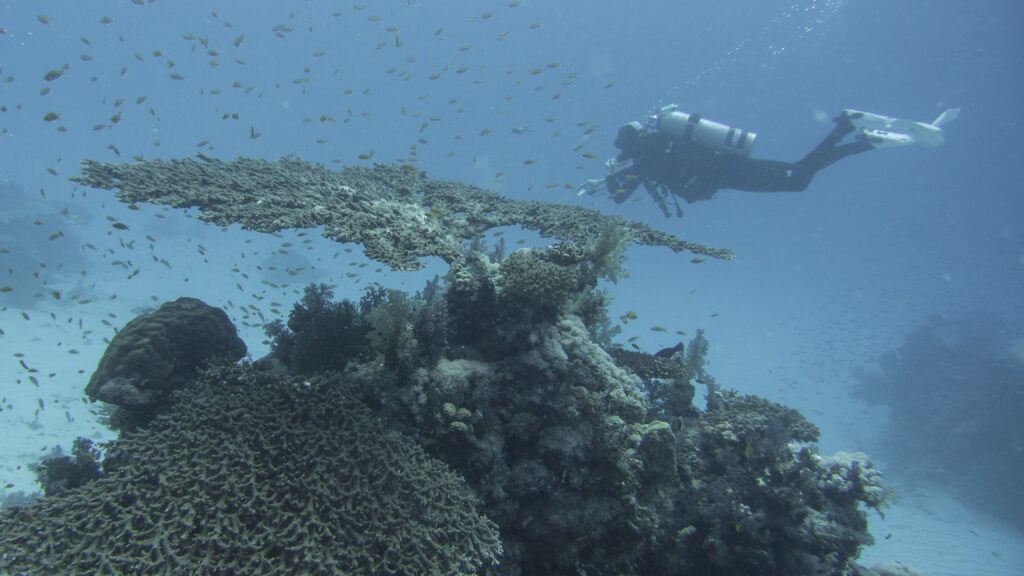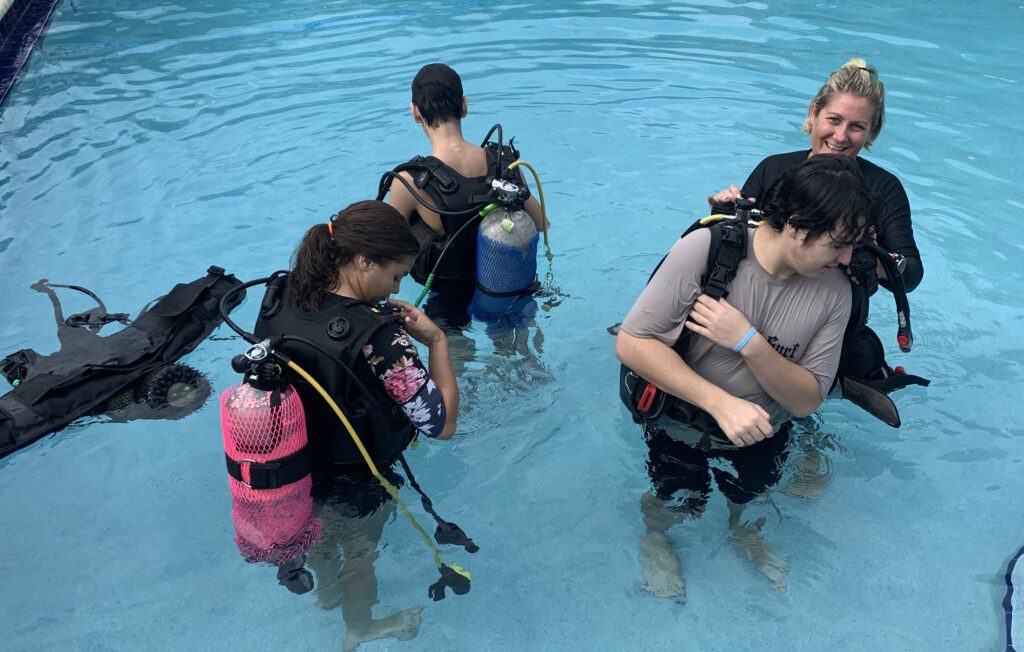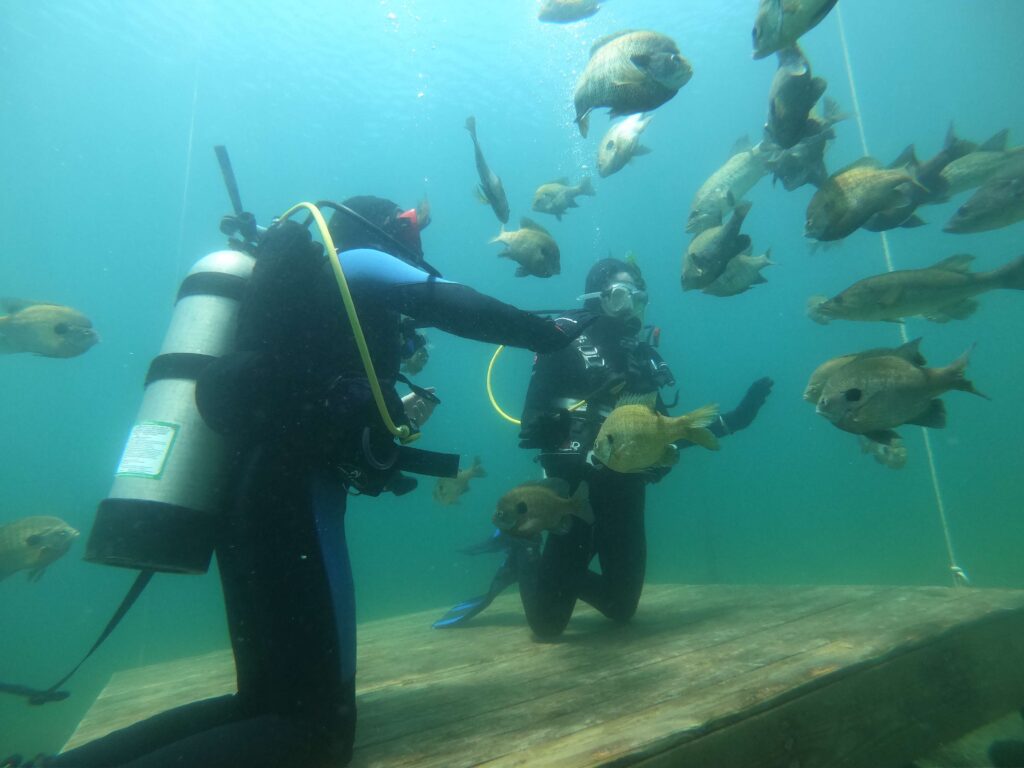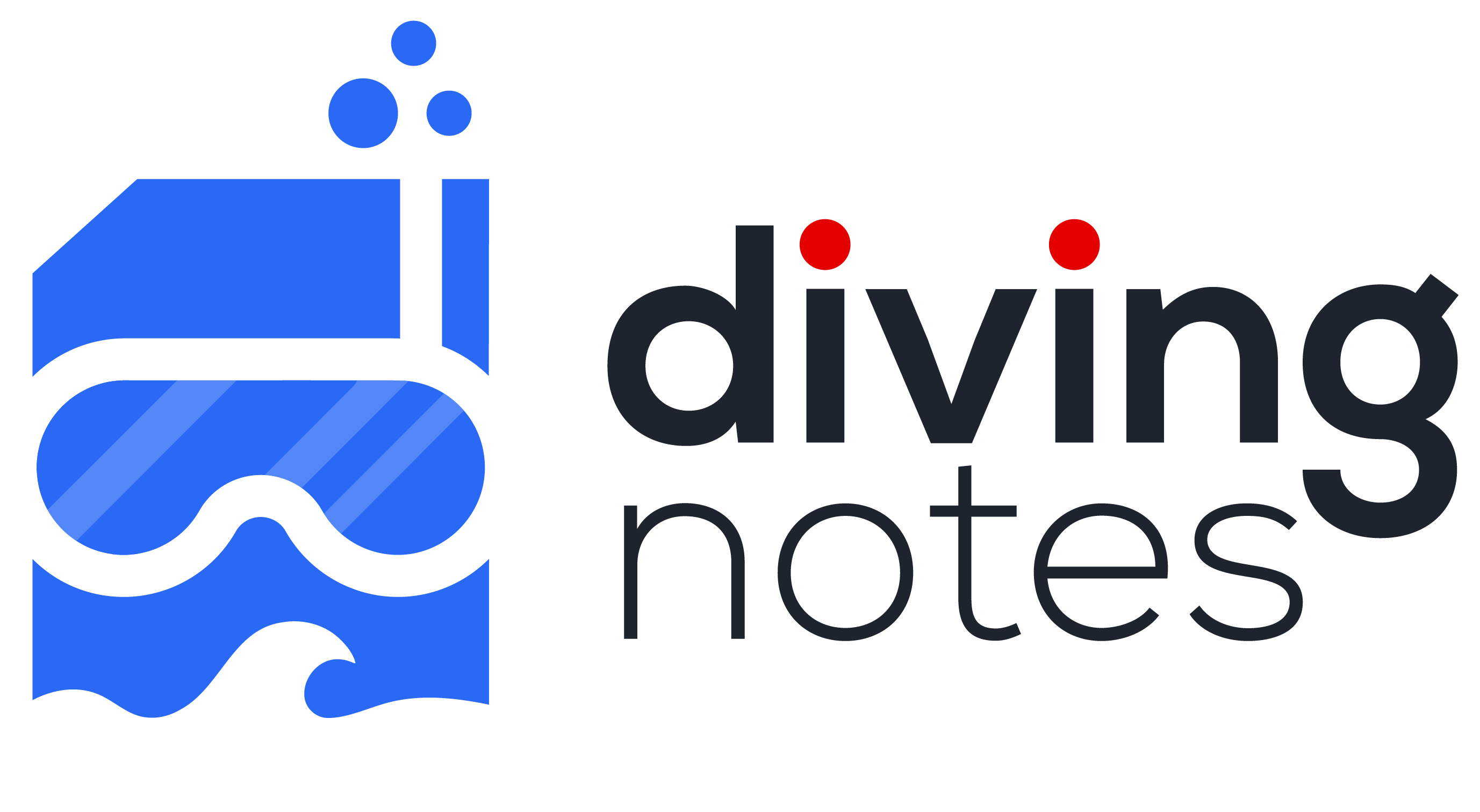If you’re looking to scuba dive on vacation, there are a few things you need to know before hitting the water. In this blog post, we will outline everything you need to learn about scuba diving on vacation and what you need to do.
It’s easier than ever before to get certified in scuba diving. If you are planning your next beach vacation and are thinking about the beauty of the ocean and capturing amazing undersea photographs. Maybe you have snorkeled in the past on a beautiful ocean reef but want to get closer to marine life. Or experience the ability to hover in space in the serenity of the underwater world or go on a real dive adventure.
So far in 2022 over 60,000 Americans have become first-time scuba divers – which is lower than the pre-pandemic levels. But starting to get back to normal. This presents a great opportunity for new divers to get ready access to instructors with smaller classes and new ways of learning how to scuba dive.
What is a scuba certification?
The typical starting point for becoming certified is what is called open water certification. This is the basic certification that will start unlocking the beauty of the underwater world for you. Understanding where to start can be a challenge. There are all sorts of different agencies with different acronyms – PADI, SSI, NAUI, SDI, BSAC, CMAS, IANTD,… Each of these agencies have slightly different methods of teaching you the basics of scuba diving but all of them base their training on a common set of ISO standards.
It does not matter what agency you use to get certified as long as it is one of the core internationally recognized ones listed above. Since scuba diving is a self-regulating sport – dive shops will not let you on their boat, lead you on a dive, or fill an air tank unless you have a recognized scuba diving certification.

Dive in amazing locations
Most importantly – Make sure you are comfortable in the water
You don’t need to be an amazing swimmer to be a great scuba diver and head out on a scuba diving vacation. You just need to be comfortable in the water to be a good scuba diver. What do I mean by comfortable in the water? Are you able to be underwater without a mask or goggles? Are you comfortable floating in the water? Can you swim a little bit? What is most important is that you are not fearful or super nervous in the water. If you need to improve your skills and get more comfortable with being in the water I recommend going to your local pool, or taking some swim lessons. Even spending a little time just a few days a week for a short period of time just enjoying the water and getting yourself completely comfortable with it.
Many scuba schools have short ‘try scuba’ or ‘discover scuba’ type classes that give you a chance to work with a certified instructor to try breathing underwater and learn a little bit about working with scuba equipment which may help you get a little more comfortable with what scuba diving is like and if it is for you before investing in the cost of an introductory scuba course.
You can do some snorkeling to get comfortable with being out in the open water. This also gets you familiar with using equipment like a mask and snorkel and even a little bit about equalizing when you descend to depths.
The bottom line is getting comfortable in the water will make your scuba experience much more enjoyable and safer.
Give Scuba Diving a Try!
If you are not quite ready to dive right into a full scuba diving vacation or you are not sure about how comfortable you are in the water, most dive shops and resort operators have ‘try scuba’ or ‘discover scuba’ programs. These introductory classes are scuba diving short courses designed to introduce you to the basics of scuba diving. In these classes, you learn about the equipment used in scuba diving and get a chance to breathe underwater on scuba diving gear. They are a stepping stone to open water certification.
Get Certified
Scuba diving had always been on my list of things to do, a few of my friends were certified, but I just had not done it. If I had known what I was missing for so many years, I would have done it so much sooner. Don’t make the same mistake I did – get certified to scuba dive now! That way you will get years of enjoyment in this amazing watersport.
Get scuba certified on vacation or at home?
Personally, I would not recommend trying to get your scuba certification while on vacation, unless you have at least a week – even that can be dicey. You will need a minimum of 3 days to get your diving certification. You are best served to do your course at a local dive shop (LDS) if you have one conveniently located. Or at least do your eLearning along with your confined water dives locally then complete your open water dives when on vacation.

My kids starting their first pool session
High level here is what it takes to get your scuba certification
- Digital Learning / Course Book – baseline materials, quizzes
- Classroom session(s) – review the materials, and enrich with real-world experiences – written exam
- Pool Sessions – learn the basic skills in confined water
- Open water sessions – repeat the skills you learned in the pool in the open water!
I was in Jamaica and, I’m not much of a beach guy, I don’t like sitting around in the sun. So I noticed that the resort we were at had an option to get certified. So I signed up – back when I started there wasn’t eLearning / digital scuba courses so I sat around the resort and read the course book for a day.
The next day I did my confined water (pool). Unfortunately the next day we were supposed to do the open water portion of the scuba course – and the weather turned bad – the seas were choppy and we were unable to get out. The rough seas continued for a couple more days ultimately making it impossible for me to finish my scuba certification while on vacation.
Think about the timing of your last dive
Since you should not fly right after scuba diving – you usually want 18+ hours after your last dive before flying. I was never able to get my open water session done while on vacation and missed the chance to dive in Jamacia 🙁
You can finish your certification on vacation – what is a scuba referral?
You have just under a year after your course starts to get your course completed so I ended up eventually traveling to the Florida Keys and doing what is called a referral. A scuba referral is where you complete your class and pool sessions with one shop or instructor but then go to a different dive center/instructor to finish via a referral program. It ended up working out well for me. I found a great shop in the Florida Keys, that I now do a lot of diving with, but it was almost a year later by the time I finished my initial open water scuba certification.
However, you can (and probably should) do the opposite of what I did – don’t waste your precious vacation time and do your course work and pool sessions at home and your open water dives via referral while on vacation. This minimizes the amount of time you need to spend learning while on vacation. But also gets you diving in amazing dive spots right from the start with a trained guide and instructor.
The other advantage of doing a referral program is after getting your coursework and confined water completed locally, you get a chance to learn a little about your local dive shop and what they have to offer. But also if you are going to primarily dive while on vacation in tropical environments and don’t already live in one it lets you get practical experience in open water with an instructor in the type of environment you plan to typically dive in.
Find the right dive instructor for you
Do some research on the dive center – find out about their diving instructors. It’s the dive instructor that makes or breaks your scuba diving learning experience. It won’t matter if the shop is NAUI, PADI, SSI, or SDI as noted before they all train to the same standards. All of those dive agency certifications are recognized worldwide.
It is important to find a great instructor that teaches well, has the experience, and makes learning to scuba dive fun. A terrible instructor at a great shop will make your experience less than satisfying. So do a little research, read reviews, and find out what the instructors are like at the place you plan to get certified.

You have amazing experiences scuba diving.
What about the dive gear?
As a beginner scuba diver heading out on vacation you typically won’t have your own gear. Most dive centers you work with on vacation will have plenty of gear you can rent to get started. I do recommend that you spend some time finding the right mask and bringing it with you.
Fitting a mask is a combination of art and science so going to a local dive shop and test fitting the wide variety of sizes, shapes, framed, frameless, single, and multiple window masks will help you find one that is comfortable and won’t leak. A leaky mask makes diving annoying and uncomfortable so making sure as a beginner you have the right mask will greatly increase your enjoyment of your diving adventure.
I hope this helps you understand what is needed to scuba dive on vacation. Scuba diving is a great lifelong sport that can be enjoyed by people of all ages and sizes. Once you get certified it’s easy to find scuba diving adventures in new places all around the world. Enjoy your vacation and don’t miss out on your next diving adventure.
Updated on: December 05, 2023

